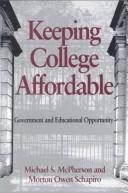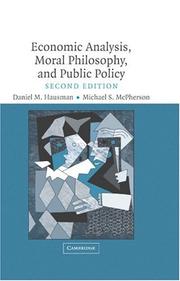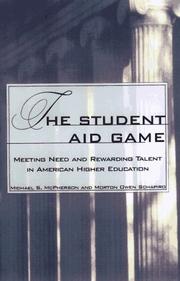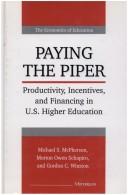| Listing 1 - 10 of 17 | << page >> |
Sort by
|
Book
Year: 1982 Publisher: Chicago, Ill.,
Abstract | Keywords | Export | Availability | Bookmark
 Loading...
Loading...Choose an application
- Reference Manager
- EndNote
- RefWorks (Direct export to RefWorks)
Book
ISBN: 022625948X 022625934X 9780226259482 9780226259345 9780226259512 022625951X Year: 2015 Publisher: Chicago London
Abstract | Keywords | Export | Availability | Bookmark
 Loading...
Loading...Choose an application
- Reference Manager
- EndNote
- RefWorks (Direct export to RefWorks)
In this book, philosopher Harry Brighouse and Spencer Foundation president Michael McPherson bring together leading philosophers to think about some of the most fundamental questions that higher education faces. Looking beyond the din of arguments over how universities should be financed, how they should be run, and what their contributions to the economy are, the contributors to this volume set their sights on higher issues: ones of moral and political value. The result is an accessible clarification of the crucial concepts and goals we so often skip over—even as they underlie our educational policies and practices. The contributors tackle the biggest questions in higher education: What are the proper aims of the university? What role do the liberal arts play in fulfilling those aims? What is the justification for the humanities? How should we conceive of critical reflection, and how should we teach it to our students? How should professors approach their intellectual relationship with students, both in social interaction and through curriculum? What obligations do elite institutions have to correct for their historical role in racial and social inequality? And, perhaps most important of all: How can the university serve as a model of justice? The result is a refreshingly thoughtful approach to higher education and what it can, and should, be doing.
Education, Higher --- Moral and ethical aspects. --- Aims and objectives. --- Education, Higher - Moral and ethical aspects --- Education, Higher - Aims and objectives --- higher education, learning, teaching, morality, ethics, morals, judgement, justice, philosophy, economics, economy, university, college, undergraduate, politics, political, aims, liberal arts, justification, humanities, inequality, race, gender and sexuality, objectives, virtue, epistemology, future research, equality, equity, history.
Book
ISBN: 0691229937 9780691229935 Year: 2023 Publisher: Princeton, New Jersey : Princeton University Press,
Abstract | Keywords | Export | Availability | Bookmark
 Loading...
Loading...Choose an application
- Reference Manager
- EndNote
- RefWorks (Direct export to RefWorks)
"An invaluable primer on the role economic reasoning plays in campus debate and decision making. Campus Economics provides college and university administrators, trustees, and faculty with an essential understanding of how college finances actually work. Sandy Baum and Michael McPherson explain the concepts needed to analyze the pros, the cons, and the trade-offs of difficult decisions, and offer a common language for discussing the many challenges confronting institutions of higher learning today, from COVID-19 to funding cuts and declining enrollments. Emphasizing the unique characteristics of the academic enterprise and the primacy of the institutional mission, Baum and McPherson use economic concepts such as opportunity cost and decisions at the margin to facilitate conversations about how best to ensure an institution's ongoing success. The problems facing higher education are more urgent than ever before, but the underlying issues are the same in good times and bad. Baum and McPherson give nontechnical, user-friendly guidance for navigating all kinds of economic conditions and draw on real-world examples of campus issues to illustrate both institutional constraints and untapped opportunities. Campus Economics helps faculty, administrators, trustees, and government policymakers engage in constructive dialogue that can lead to decisions that align finite resources with the pursuit of the institutional mission"-- "An invaluable primer on the role economic reasoning plays in campus debate and decision making"--
Universities and colleges --- EDUCATION / Higher. --- Colleges --- Degree-granting institutions --- Higher education institutions --- Higher education providers --- Institutions of higher education --- Postsecondary institutions --- Public institutions --- Schools --- Education, Higher --- Administration --- Decision making. --- Finance. --- Ability To Pay. --- And Interest. --- Associate degree. --- Athletic Performance. --- Austerity. --- Bachelor's degree. --- Boutique. --- Budget constraint. --- Budget. --- Budgets. --- Campus. --- Cartesian coordinate system. --- Class size. --- Complementary good. --- Cost of attendance. --- Cost–benefit analysis. --- Currency. --- Curriculum development. --- Customer. --- Designer. --- Dynastic wealth. --- Economic equilibrium. --- Economics. --- Employment. --- Expense. --- Faculty (academic staff). --- Family structure in the United States. --- Financial endowment. --- Fiscal Effort. --- For Men. --- For-profit higher education in the United States. --- Full-time equivalent. --- Funding. --- Governance. --- Graduate school. --- Grandparent. --- Gratification. --- Higher education. --- Household. --- Illustration. --- Income. --- Inefficiency. --- Inflation. --- Institution. --- Insurance. --- Interest. --- Investment. --- J. C. Penney. --- Labour economics. --- Liberal arts college. --- Liberal arts education. --- List price. --- Market (economics). --- Master's degree. --- Middle class. --- Multinational corporation. --- NCAA Division III. --- Nest Egg. --- News. --- No Free Lunch (organization). --- Nonprofit organization. --- Of Education. --- Operating budget. --- Operating expense. --- Opportunity cost. --- Paycheck. --- Percentage point. --- Percentage. --- Philosophy. --- Policy analysis. --- Policy. --- Private school. --- Private sector. --- Private university. --- Productivity And Costs. --- Public institution (United States). --- Public university. --- Rates (tax). --- Research center. --- Retirement Contribution. --- Retirement. --- Revenue. --- Salary. --- Savings account. --- Social science. --- State government. --- Student loan. --- Supply (economics). --- Tax. --- Teacher. --- Testimonial. --- The Chronicle of Higher Education. --- Trade-off. --- Tuition freeze. --- Tuition payments. --- United States Department of Education. --- Values education. --- Vanderbilt University. --- Year. --- United States. --- ABŞ --- ABSh --- Ameerika Ühendriigid --- America (Republic) --- Amerika Birlăshmish Shtatlary --- Amerika Birlăşmi Ştatları --- Amerika Birlăşmiş Ştatları --- Amerika ka Kelenyalen Jamanaw --- Amerika Qūrama Shtattary --- Amerika Qŭshma Shtatlari --- Amerika Qushma Shtattary --- Amerika (Republic) --- Amerikai Egyesült Államok --- Amerikanʹ Veĭtʹsėndi͡avks Shtattnė --- Amerikări Pĕrleshu̇llĕ Shtatsem --- Amerikas Forenede Stater --- Amerikayi Miatsʻyal Nahangner --- Ameriketako Estatu Batuak --- Amirika Carékat --- AQSh --- Ar. ha-B. --- Arhab --- Artsot ha-Berit --- Artzois Ha'bris --- Bí-kok --- Ē.P.A. --- É.-U. --- EE.UU. --- Egyesült Államok --- ĒPA --- Estados Unidos --- Estados Unidos da América do Norte --- Estados Unidos de América --- Estaos Xuníos --- Estaos Xuníos d'América --- Estatos Unitos --- Estatos Unitos d'America --- Estats Units d'Amèrica --- Ètats-Unis d'Amèrica --- États-Unis d'Amérique --- ÉU --- Fareyniḳṭe Shṭaṭn --- Feriene Steaten --- Feriene Steaten fan Amearika --- Forente stater --- FS --- Hēnomenai Politeiai Amerikēs --- Hēnōmenes Politeies tēs Amerikēs --- Hiwsisayin Amerikayi Miatsʻeal Tērutʻiwnkʻ --- Istadus Unidus --- Jungtinės Amerikos valstybės --- Mei guo --- Mei-kuo --- Meiguo --- Mî-koet --- Miatsʻyal Nahangner --- Miguk --- Na Stàitean Aonaichte --- NSA --- S.U.A. --- SAD --- Saharat ʻAmērikā --- SASht --- Severo-Amerikanskie Shtaty --- Severo-Amerikanskie Soedinennye Shtaty --- Si͡evero-Amerikanskīe Soedinennye Shtaty --- Sjedinjene Američke Države --- Soedinennye Shtaty Ameriki --- Soedinennye Shtaty Severnoĭ Ameriki --- Soedinennye Shtaty Si͡evernoĭ Ameriki --- Spojené obce severoamerické --- Spojené staty americké --- SShA --- Stadoù-Unanet Amerika --- Stáit Aontaithe Mheiriceá --- Stany Zjednoczone --- Stati Uniti --- Stati Uniti d'America --- Stâts Unîts --- Stâts Unîts di Americhe --- Steatyn Unnaneysit --- Steatyn Unnaneysit America --- SUA --- Sŭedineni amerikanski shtati --- Sŭedinenite shtati --- Tetã peteĩ reko Amérikagua --- U.S. --- U.S.A. --- United States of America --- Unol Daleithiau --- Unol Daleithiau America --- Unuiĝintaj Ŝtatoj de Ameriko --- US --- USA --- Usono --- Vaeinigte Staatn --- Vaeinigte Staatn vo Amerika --- Vereinigte Staaten --- Vereinigte Staaten von Amerika --- Verenigde State van Amerika --- Verenigde Staten --- VS --- VSA --- Wááshindoon Bikéyah Ałhidadiidzooígíí --- Wilāyāt al-Muttaḥidah --- Wilāyāt al-Muttaḥidah al-Amirīkīyah --- Wilāyāt al-Muttaḥidah al-Amrīkīyah --- Yhdysvallat --- Yunaeted Stet --- Yunaeted Stet blong Amerika --- ZDA --- Združene države Amerike --- Zʹi͡ednani Derz͡havy Ameryky --- Zjadnośone staty Ameriki --- Zluchanyi͡a Shtaty Ameryki --- Zlucheni Derz͡havy --- ZSA

ISBN: 0815756410 0815756429 Year: 1991 Publisher: Washington, D.C. Brookings Institution
Abstract | Keywords | Export | Availability | Bookmark
 Loading...
Loading...Choose an application
- Reference Manager
- EndNote
- RefWorks (Direct export to RefWorks)
Higher education --- United States --- College attendance --- Federal aid to higher education --- Student aid --- Universités --- Aide de l'Etat à l'enseignement supérieur --- Etudiants --- Statistics --- Inscriptions --- Statistiques --- Aide financière --- Universités --- Aide de l'Etat à l'enseignement supérieur --- Aide financière --- United States of America

ISBN: 0521558506 0521552028 9780521552028 9780521558501 Year: 1996 Publisher: Cambridge: Cambridge university press,
Abstract | Keywords | Export | Availability | Bookmark
 Loading...
Loading...Choose an application
- Reference Manager
- EndNote
- RefWorks (Direct export to RefWorks)
Economics --- Moral and ethical aspects. --- 172 --- 330.1 --- 174.5 --- 174.5 Economische ethiek. Speculatie --- Economische ethiek. Speculatie --- Economic theory --- Political economy --- Social sciences --- Economic man --- Moral and ethical aspects --- Sociale ethiek --- Methodologie van de economie --- Social ethics --- Methodology of economics --- Economie politique --- Aspect moral --- filosofie --- ethiek --- economie (algemeen) --- Economics - Moral and ethical aspects --- Economics - Moral and ethical aspects. --- ECONOMICS --- MORAL AND ETHICAL ASPECTS

ISBN: 9780521846295 9780521608664 0521846293 052160866X 9780511754289 051114685X 9780511146855 0511146647 9780511146640 9786610347049 6610347042 1107713846 128034704X 0511145837 0511754280 0511312431 0511146272 9781107713840 9780511144929 051114492X Year: 2006 Publisher: New York Cambridge University Press
Abstract | Keywords | Export | Availability | Bookmark
 Loading...
Loading...Choose an application
- Reference Manager
- EndNote
- RefWorks (Direct export to RefWorks)
This 2006 book shows through accessible argument and numerous examples how understanding moral philosophy can improve economic analysis, how moral philosophy can benefit from economists' analytical tools, and how economic analysis and moral philosophy together can inform public policy. Part I explores rationality and its connections to morality. It argues that in defending their model of rationality, mainstream economists implicitly espouse contestable moral principles. Part II concerns welfare, utilitarianism and standard welfare economics, while Part III considers important moral notions that are left out of standard welfare economics, such as freedom, rights, equality, and justice. Part III also emphasizes the variety of moral considerations that are relevant to evaluating policies. Part IV then introduces technical work in social choice theory and game theory that is guided by ethical concepts and relevant to moral theorizing. Chapters include recommended readings and the book includes a glossary of relevant terms.
Methodology of economics --- Economics --- Ethics --- Political planning --- 174.5 --- Planning in politics --- Public policy --- Planning --- Policy sciences --- Politics, Practical --- Public administration --- Deontology --- Ethics, Primitive --- Ethology --- Moral philosophy --- Morality --- Morals --- Philosophy, Moral --- Science, Moral --- Philosophy --- Values --- Economic theory --- Political economy --- Social sciences --- Economic man --- 174.5 Economische ethiek. Speculatie --- Economische ethiek. Speculatie --- Moral and ethical aspects --- Ethics. --- Political planning. --- Moral and ethical aspects. --- Business, Economy and Management --- Economics - Moral and ethical aspects

ISBN: 0691057834 0691230919 0691005362 Year: 1998 Publisher: Princeton, N.J. : Princeton University Press,
Abstract | Keywords | Export | Availability | Bookmark
 Loading...
Loading...Choose an application
- Reference Manager
- EndNote
- RefWorks (Direct export to RefWorks)
Student aid in higher education has recently become a hot-button issue. Parents trying to pay for their children's education, college administrators competing for students, and even President Bill Clinton, whose recently proposed tax breaks for college would change sharply the federal government's financial commitment to higher education, have staked a claim in its resolution. In The Student Aid Game, Michael McPherson and Morton Owen Schapiro explain how both colleges and governments are struggling to cope with a rapidly changing marketplace, and show how sound policies can help preserve the strengths and remedy some emerging weaknesses of American higher education. McPherson and Schapiro offer a detailed look at how undergraduate education is financed in the United States, highlighting differences across sectors and for students of differing family backgrounds. They review the implications of recent financing trends for access to and choice of undergraduate college and gauge the implications of these national trends for the future of college opportunity. The authors examine how student aid fits into college budgets, how aid and pricing decisions are shaped by government higher education policies, and how competition has radically reshaped the way colleges think about the strategic role of student aid. Of particular interest is the issue of merit aid. McPherson and Schapiro consider the attractions and pitfalls of merit aid from the viewpoint of students, institutions, and society. The Student Aid Game concludes with an examination of policy options for both government and individual institutions. McPherson and Schapiro argue that the federal government needs to keep its attention focused on providing access to college for needy students, while colleges themselves need to constrain their search for strategic advantage by sticking to aid and admission policies they are willing to articulate and defend publicly.
Student aid --- College students --- Education, Higher --- Etudiants --- Enseignement supérieur --- Scholarships, fellowships, etc. --- Finance. --- Aide financière --- Finances --- EDUCATION / Higher. --- Admit-deny. --- American Freshman Survey. --- Amherst College. --- Bowdoin College. --- Breneman, David. --- Campus-based programs. --- Clinton, Bill. --- Dartmouth College. --- Differential packaging. --- Direct Loan Program. --- Earnings gaps. --- Equal opportunity issues. --- Federal Perkins Loan program. --- Federal Work-Study (FWS) program. --- Gapping. --- Gender differences, merit aid and. --- Harvard College. --- Honors Scholarship program. --- Johnson, Lyndon. --- Kane, Tom. --- Loans. --- Meiszkowski, Peter. --- Merit aid. --- Middle-income melt. --- National policies, role of. --- Need-aware second review. --- Needs analysis system. --- Nixon, Richard. --- PLUS program. --- Pell grants. --- Revenue sources, changes in. --- Sauvageau, Yvon. --- Stafford loans. --- State and local government aid. --- Stecklow, Steve. --- Tax credits or tax deductions, for tuition. --- University of Vermont. --- Upper-income students, college selection by. --- Wellstone, Paul. --- Wesleyan College. --- Winston, Gordon. --- Work programs. --- Aid, Student --- Financial aid, Student --- Financial aid to students --- Student financial aid --- Student financial assistance --- Education --- College life --- Universities and colleges --- University students --- Students --- Finance

ISBN: 0472104047 9780472104048 Year: 1993 Publisher: Ann Arbor (Mich.): University of Michigan press,
Abstract | Keywords | Export | Availability | Bookmark
 Loading...
Loading...Choose an application
- Reference Manager
- EndNote
- RefWorks (Direct export to RefWorks)
Education, Higher --- Student aid --- Universities and colleges --- Enseignement supérieur --- Etudiants --- Universités --- Finance --- Administration --- Finances --- Aide financière --- Enseignement supérieur --- Universités --- Aide financière --- Education, Higher - Finance - United States --- Student aid - United States --- Universities and colleges - Administration - United States
Book
ISBN: 1107158311 9781316610886 1316610888 9781107158313 Year: 2017 Publisher: New York (N.Y.): Cambridge university press,
Abstract | Keywords | Export | Availability | Bookmark
 Loading...
Loading...Choose an application
- Reference Manager
- EndNote
- RefWorks (Direct export to RefWorks)
"This book shows through argument and numerous policy-related examples how understanding moral philosophy can improve economic analysis, how moral philosophy can benefit from economists' analytical tools, and how economic analysis and moral philosophy together can inform public policy. Part I explores the idea of rationality and its connections to ethics, arguing that when they defend their formal model of rationality, most economists implicitly espouse contestable moral principles. Part II addresses the nature and measurement of welfare, utilitarianism and cost-benefit analysis. Part III discusses freedom, rights, equality, and justice - moral notions that are relevant to evaluating policies, but which have played little if any role in conventional welfare economics. Finally, Part IV explores work in social choice theory and game theory that is relevant to moral decision making. Each chapter includes recommended reading and discussion questions." --
Economics --- Ethics --- Political planning
Book
ISBN: 9781400831463 Year: 2009 Publisher: Princeton, NJ
Abstract | Keywords | Export | Availability | Bookmark
 Loading...
Loading...Choose an application
- Reference Manager
- EndNote
- RefWorks (Direct export to RefWorks)
| Listing 1 - 10 of 17 | << page >> |
Sort by
|

 Search
Search Feedback
Feedback About UniCat
About UniCat  Help
Help News
News